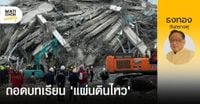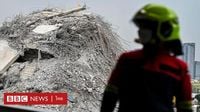In the wake of a catastrophic building collapse in Bangkok, the investigation continues into the causes behind the disaster that has claimed at least 44 lives and left many others missing. The 30-story office building for the Office of the Auditor General of Thailand (OAG) was under construction when it collapsed on March 28, following a significant earthquake in Myanmar that registered 8.2 on the Richter scale.
The earthquake, whose epicenter was located approximately 1,100 kilometers from Bangkok, sent tremors across the region, leading to the collapse of the OAG building, which had been budgeted at 2.1 billion baht. Suriyachai Ruengworarat, a senior official from the Bangkok Metropolitan Administration (BMA), described the collapse as resembling a "pancake collapse," where the structure fell straight down, floor by floor.
As of April 15, search and rescue operations are still underway, with officials reporting that around 50 individuals remain unaccounted for. The building’s construction was only about 33% complete at the time of the incident, raising serious questions about safety standards and oversight in the construction process.
The collapse has sparked outrage and concern among the public and officials alike, particularly regarding the construction practices of the joint venture responsible for the project, which includes Italian-Thai Development (ITD) and China Railway Number 10 (Thailand) Co., Ltd. Anuthin Charnvirakul, Thailand's Deputy Prime Minister and Minister of the Interior, has called for an urgent investigation into the incident, emphasizing the need for accountability.
Experts have pointed to several potential factors leading to the collapse, including issues related to the building's shear core, which is critical for structural integrity during seismic events. Dr. Amorn Pimanasak, President of the Association of Structural Engineers of Thailand, noted that the building should have been designed to withstand earthquakes, as per regulations established in 2007 and 2021.
Further complicating matters, investigations have revealed that the construction firm involved may have employed questionable practices, including the use of substandard materials. Reports indicate that some steel used in the building's construction did not meet industry standards, raising alarms about the quality of materials sourced from China.
In light of the ongoing investigation, the Department of Special Investigation (DSI) has uncovered troubling information about the ownership structure of the construction firm, suggesting that the Thai shareholders may serve as nominal partners for the Chinese company, raising questions about transparency and legality in the bidding process.
Additionally, the financial status of Italian-Thai Development has come under scrutiny, with reports indicating that the company has been struggling with liquidity issues and has faced protests from workers over unpaid wages. This financial instability raises concerns about the firm's ability to fulfill its contractual obligations and maintain safety standards on construction sites.
As the investigation unfolds, the Bangkok Metropolitan Administration has pledged to allocate approximately 100 million baht to address safety concerns and improve oversight in construction practices moving forward. The government aims to ensure that such a tragedy does not happen again.
The incident has also prompted a broader discussion about the state of construction in Thailand, particularly regarding the involvement of foreign firms and the need for stricter enforcement of building codes and safety regulations. The public's trust in construction practices has been shaken, and many are calling for a reevaluation of how projects are awarded and monitored.
In conclusion, the collapse of the OAG building is not just a tragic event but a wake-up call for the construction industry in Thailand. As investigations continue, the focus will be on ensuring accountability and implementing necessary reforms to protect workers and the public from future disasters.



